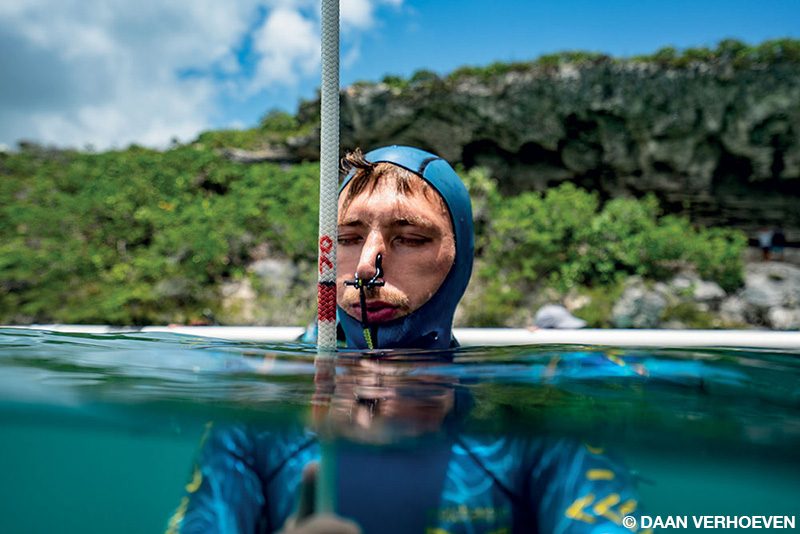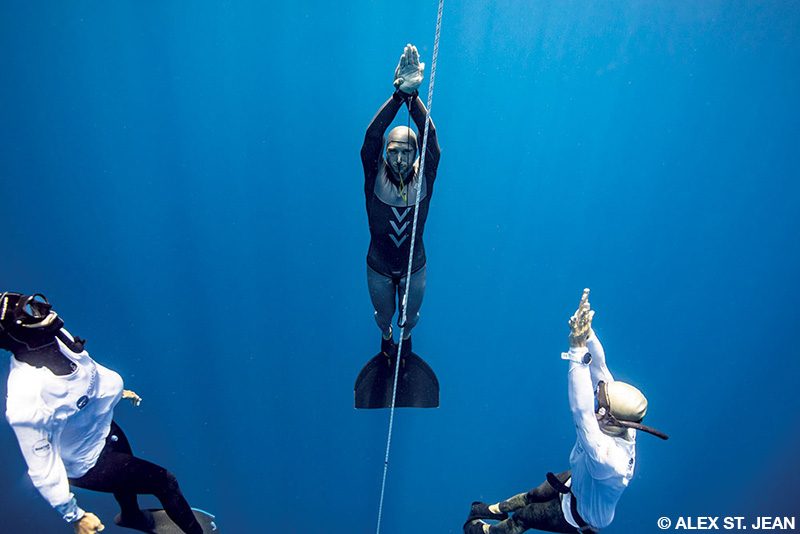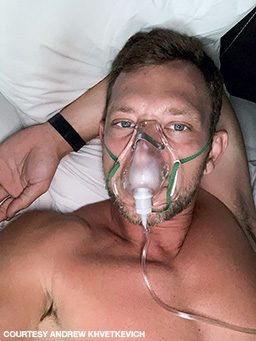Getting decompression sickness (DCS) while freediving is uncommon. Unlike when breathing compressed gas, freedivers typically do not accumulate enough nitrogen to provoke DCS. Over the past few years only a few cases of DCS during freediving have been reported, and they all were associated with repeated deep dives over a short time. Since there is little information, statistics or research about DCS occurring while freediving, most freedivers pay little attention to the problem. Until recently, I did not take seriously the possibility of DCS happening to me.
During 2019 I dedicated myself to training and participating in freediving competitions, and I set several U.S. national records. The season was intense, and I hoped to set three more records that fall at the last competition of the year in Indonesia, where I planned to dive to 328 feet (100 meters) using bifins. Arriving in advance, I had enough time for my usual one or two days of training followed by a rest day.

Five days before the competition I planned three challenging dives without a day of rest, which was a mistake. To give myself confidence, I wanted to repeat my current record dives in training. The three-day plan was to freedive to 325 feet (99 meters) using bifins, 233 feet (71 meters) without fins and 312 feet (95 meters) pulling the rope, and then have two days of rest before the competition. Everything went according to plan, but after the third day I began to feel weird.
I failed my surface protocol by showing the OK sign and saying, “I am OK” after 22 seconds, when the time allowed is 15 seconds. The delay occurred because I was hypoxic, meaning that my body had inadequate oxygen. After getting to the platform, I felt weak and immediately began to breathe oxygen, which is a routine practice after a deep dive. The doctor noticed that something was wrong and told me to continue breathing the oxygen for about 30 minutes instead of the usual five minutes. I returned to shore, where my pulse, blood pressure and oxygen saturation levels were checked and found to be a bit off but still within normal limits.

I felt tired and returned to my hotel, where I soon noticed numbness and tingling in the entire left side of my body and the thumb and forefinger of my right hand. I didn’t know much about DCS and didn’t understand the seriousness of the situation, so I decided to try to sleep it off, but the weird sensations did not disappear with rest. While showering a little later, I noticed that the left side of my body did not recognize the water temperature. The next morning, my left hand stopped tingling, and the numbness subsided, so I decided to sleep all day, expecting that all the symptoms would soon pass. But my symptoms remained the same the following morning.

Understanding that I wouldn’t be able to compete now, I told the organizer about my problem. The symptoms indicated DCS, which meant that I needed to start a hyperbaric chamber treatment as soon as possible. I have DAN® insurance, so the competition’s organizers immediately contacted DAN. No evacuation could happen that day since the local airport closed at 5 p.m., so I would depart the next morning.
An ambulance took me straight from the hotel to the airport, and I was on a plane 72 hours after my dive. The aircraft was a private medical jet, and the staff and pilots understood that I had DCS, so the plane flew at the lowest possible altitude. During the flight they monitored my oxygen saturation, and the medical staff was ready to provide oxygen if needed. The flight and transportation to the Kuala Lumpur hospital took about three hours. About 80 hours after my symptoms began, I was in a hyperbaric chamber in Kuala Lumpur.


Now I know that if DCS symptoms appear, it is critical to start a chamber treatment as soon as possible. I spent nine days in the Management and Science University Medical Centre in Kuala Lumpur, and during that time I had six sessions in a hyperbaric chamber for a total of 23 hours and 32 minutes of treatment. I felt better after each session, and by the end of the sixth session my symptoms had almost disappeared.

After I returned home, my symptoms worsened, and I called DAN again. I received five more sessions in the chamber at Mercy Hospital in Miami, Florida. My symptoms have almost disappeared again, and the doctors expect the symptoms will be gone within three months. I spent a total of 47 hours and 17 minutes in hyperbaric chambers over 11 sessions, and if I did not have DAN dive accident insurance, the medical bills would have been more than $20,000.

Now that I better understand the risks of developing DCS while freediving, I intend to be more careful by doing the following:
- not diving to my maximum depth for more than two days in a row
- taking as many rest days as necessary to fully recover between deep dives
- avoiding repeated dives to my maximum depth on the same day
- not taking a static breath-hold at a depth several times in a row
- not doing any depth freediving after scuba diving or any deep dives after static training or consuming recovery oxygen underwater
- breathing oxygen for five minutes at a depth of 16 feet (5 meters) after any dive deeper than 197 feet (60 meters) to dissolve the accumulated nitrogen in the tissues

Full lung packing leads to injuries associated with the rupture of lung tissue. I can fully pack my lungs with 25 extra breaths, but during deep dives I take 20 breaths to leave about 20 percent less than my maximum free for extra safety. Remember that for recreational freediving, lung packing is not necessary, and you must have specialized training to pack the lungs.
I learned that I should immediately call DAN when DCS symptoms appear, because the probability of a full recovery depends on how quickly you get your first hyperbaric treatment. I can rely on DAN for valuable help with evacuation, travel and dive-related medical expenses — and you can, too.
© Alert Diver — Q1 2020